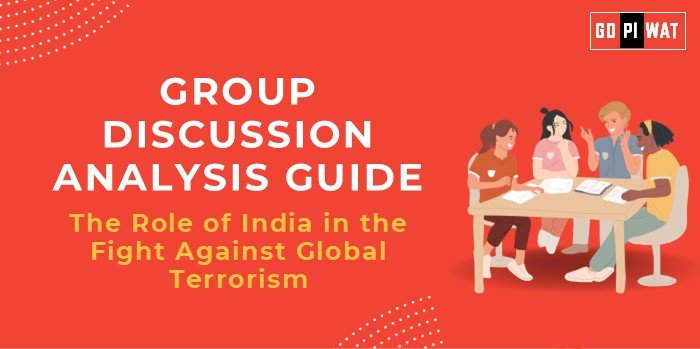📋 Group Discussion Analysis Guide
🌟 The Role of India in the Fight Against Global Terrorism
🌐 Introduction to the Role of India in Global Terrorism
Opening Context: India, a nation often at the crossroads of regional and global conflict, plays a pivotal role in combating terrorism, a menace that transcends borders and affects international peace.
Topic Background: From being a victim of terrorism to becoming a key player in global counter-terrorism efforts, India has leveraged diplomatic, military, and technological means to address the challenge. Its active participation in international coalitions and regional forums reflects a strong commitment to global security.
📊 Quick Facts and Key Statistics
- 🌍 UNSC Membership: India served as a non-permanent member of the UN Security Council (2021-2022), advocating for counter-terrorism measures.
- 💰 Defense Spending: India allocates approximately 2.5% of its GDP to defense, a portion of which is directed at counter-terrorism initiatives.
- ⚠️ Terrorist Incidents: According to Global Terrorism Index 2023, India ranks among the top 10 countries affected by terrorism, underscoring the need for robust measures.
- 🤝 Coalition Membership: Active member of the Financial Action Task Force (FATF) and Global Counterterrorism Forum (GCTF).
🤝 Stakeholders and Their Roles
- 🏛️ Government of India: Policy formation, military operations, and international diplomacy.
- 🌐 United Nations: Collaborative frameworks like the UN Global Counter-Terrorism Strategy.
- 🌏 Neighboring Countries: Bilateral agreements with nations like Afghanistan and Bangladesh for intelligence sharing.
- 🌍 International Coalitions: Contributions to FATF and other anti-terrorism coalitions.
📋 Achievements and Challenges
- 🏅 Achievements:
- Led the adoption of UNSC Resolution 2582, emphasizing counter-terrorism.
- Strengthened counter-terrorism financing through FATF compliance.
- Technological advancements like drone surveillance and AI in intelligence gathering.
- ⚠️ Challenges:
- Cross-border terrorism, particularly from Pakistan.
- Cyber-terrorism and online radicalization.
- Political and logistical hurdles in multilateral agreements.
- 🌍 Global Comparisons:
- ✅ United States: Extensive global presence in counter-terrorism operations.
- ✅ Israel: High expertise in cyber and surveillance technology.
- 📚 Case Studies:
- 2016 Uri Attack Response: India’s surgical strikes showcased proactive counter-terrorism strategy.
📚 Structured Arguments for Discussion
- 👍 Supporting Stance: “India’s role in global terrorism control has bolstered international coalitions and strengthened domestic security frameworks.”
- 👎 Opposing Stance: “Persistent regional conflicts and inconsistent policies hinder India’s full potential in combating global terrorism.”
- ⚖️ Balanced Perspective: “While India contributes significantly, addressing regional instability is crucial for its counter-terrorism efforts to be globally impactful.”
✅ Effective Discussion Approaches
- Opening Approaches:
- Quote statistics about India’s counter-terrorism initiatives.
- Discuss the geopolitical implications of terrorism in South Asia.
- Counter-Argument Handling:
- “Acknowledging cross-border challenges, India’s diplomatic efforts with FATF have achieved substantial impact in curbing terror financing.”
📊 Strategic Analysis of Strengths and Weaknesses
- 💪 Strengths: Strong defense capabilities, international cooperation, technological advancements.
- ⚡ Weaknesses: Regional instability, limited intelligence-sharing networks.
- 🚀 Opportunities: Leadership in AI-based counter-terrorism, strengthening global coalitions.
- ⚠️ Threats: Escalation of state-sponsored terrorism, cyber threats.
🌍 Connecting with B-School Applications
- 📈 Real-World Applications: Understanding global strategy, security operations management, or geopolitical finance.
- 💬 Sample Interview Questions:
- “How does terrorism affect global business?”
- “Discuss India’s role in countering cyber-terrorism.”
- 💡 Insights for B-School Students:
- Effective policy-making, managing international relations, and analyzing geopolitical risks.


